Emmy-winning composer Jeff Russo has been at the forefront of scoring the music for Star Trek’s return to television on CBS ALL Access. After composing for Star Trek: Discovery and Short Treks, Russo was tapped to create the music for Star Trek: Picard. Just in time for today’s digital release of the complete season one soundtrack, TrekMovie spoke to Russo about his work on the show and his other Treks.
Interview with Jeff Russo
How would you say your approach to Star Trek: Picard has been different than to Star Trek: Discovery?
I am not sure my approach is all that different in terms of how I approach any narrative. But it is definitely a different vibe because the show itself a totally different vibe. This is a lot more of a contemplative show. It is a lot more about one man’s journey for self-assessment to right things that he felt he may have done wrong or incorrect, or things that he wasn’t able to accomplish. And because it is about that, I needed the score to be a little more tuned into that, a little more intimate in that. It is different that Discovery, which has a way broader sense in terms of the way we go about telling that story, it’s much bigger. It’s about the whole as opposed to one single person’s journey.
You contrast the shows by using words like intimate and bigger. In a practical sense, how are the different orchestras comprised for Picard and Discovery?
I am definitely utilizing more flutes in Picard, and definitely utilizing a smaller brass section and a smaller set of horns than in Discovery. It is not quite as swashbuckling. Percussion is also a lot smaller and using more individual percussion as opposed to ensemble percussion. The string section for Picard was actually slightly larger, but that was just me wanting to be able to really accent certain melodic structures. Generally speaking, the size of the orchestra is not necessarily what changes the tone or sound, it is really about how that orchestra is utilized.
One of the ways Picard differs is more use of classic Star Trek musical stings. What is the process for when and how you decide to dip into the classics?
It kind of speaks for itself in my opinion. I am a fan of Star Trek myself so when I spot an episode, I spot it from two perspectives. I spot it from a creator perspective for how to tell a story, and also from the fan perspective, and how do I want the story to be told. How do I feel it would be really worth the musical usage of something in any given place. Like in Discovery when you saw the Enterprise for the first time, well yeah, Alexander Courage’s theme has got to play there. I pay tribute and give a lot of deference to the Star Trek composers that have come before me, every one of them. They are all so amazing. We are talking about some of the greatest film and television composers that have ever been. It makes me feel like I am standing in the shadow of giants. So, when I have the opportunity to give a nod to the [Jerry] Goldsmith theme from Star Trek: The Motion Picture, I am going to. It is not just about throwing it around and utilizing it handy-pandy. I don’t just use it whenever. I try to use those things when I feel it is important to the storytelling.
The show has been described by the producers as a 10-hour movie. Is that how you approached composing it?
It feels like a three-act play to me. Those first three episodes where he was preparing his journey and getting a crew together is sort of insular. And then the next four episodes in going out and searching out for the things he needed to get what he needed his journey is the second act, and the last three is the third. They are all tied together, it is all one storyline, but for me, I was treating it in three different parts from a melodic standpoint.
Another difference from Discovery is that Picard allows for longer, quieter moments. There are entire scenes with little or no dialog, like with Rios in “Broken Pieces” where he is looking through his past, and the music is telling the story. When they bring these moments to you, do you find it daunting or freeing?
It is neither, it is thrilling. I’m helping tell the story in a much deeper way at that moment when all there is is the music. The same held true with the Soji and Narek waltz in episode 4 (“Absolute Candor”). The ability to tell the story with music and without much dialog is a lot of fun for me. That is a very cinematic part of the art form. That is one of the things we talked about at the beginning of working on this show. Alex [Kurtzman] and Michael [Chabon] wanted it to be a quieter show. They wanted it to be more cinema, and when I say “cinema” I don’t mean it is like a movie, because we approach Discovery in the same way. What I mean by cinema, I am talking about those long moments that you feel in movies, in dramatic pieces. Those can be absent from television. In television, they just want to get there quick, get to the point, get to the point! We try to not do that. We wanted to let the audience get there. We wanted to sit for a moment on the shot. Let the shot be the shot. Let the music come in and help tell the story. That is a very different way to make television. I try to make moments like that happen in everything I do because to me those are the best moments. I love those moments! That is the stuff that dreams are made of for composers.
Another scene like that was the death of Picard in the finale, as he slowly died in Raffi’s arms and the scene lingered. And instead of going mournful, you kind of went uplifting. Can you talk through how you scored that key moment?
I feel like the word I wanted to use there was “resolute.” It is not mournful. I don’t ever like to play on the nose when I am not asked to. Play the music of what the characters are feeling, not what the characters are doing. Yes, he was dying and I could have played he was dying music, but it wasn’t really about that. It was about him feeling resolved and that resolution and that can be freeing. So I really wanted to push on that instead of “oh we are sad” and so we need sad music.
Looking at the last five episodes featured in the new complete season one soundtrack, are there any in there that were particularly fun, or challenging, or frustrating?
It’s all fun, and it’s all frustrating, and it’s all daunting, and it’s all terrifying. There is a lot to live up to here. The end credits piece for episode 10 (“Et in Arcadia Ego, Part 2”) was a big watershed moment for me wanting to really bring out a sort of swashbuckling feeling and a more rousing feeling as we end the season. The end cue for episode 10 before it goes into that, and just that whole end sequence when we recorded “Blue Skies” with Isa [Briones], and that whole sequence from that moment to the end of the show was a complicated puzzle to try to put together with the song and then the score afterward and then end credits, and to take the listener all the way through the end.
https://www.youtube.com/watch?v=YC34tYpM5GE&t=1s
When an episode like “Nepenthe” arrives, with the return of Will Riker and Deanna Troi, is there anything special you do to prepare for that, maybe review some TNG episodes?
Not really. There is no need for me to go back and prepare on that level for something like that, because it is really about how does it make me feel because I am such a fan. I knew that when we got to that episode and we were going to have those moments with Riker and Troi that I was going to lean some on the Next Generation theme because it is a reunion of sorts, but I didn’t want to rely too heavily on it, because this is a new story.
And you waited to use it, it wasn’t the first thing.
No, of course not, because it is not just about that. We are not making a sequel. This is a different story. This is outside of that. Now it is a different life, a different world, a different everything. We are not trying to make the sequel to The Next Generation, so it isn’t about needing to use that music all the time. It was really about wanting to utilize that motif in order to evoke a feeling about the nostalgia of what those characters might be feeling since they hadn’t seen each other in so long and I wanted the audience to feel that too. You can’t just wallpaper it. What you do is only as impactful as what you don’t do right before it.
The theme that you have created for the show is very personal to Picard’s journey in season one. Could you see looking at that again for season two, or do you feel this is his theme for the series?
That is not my decision to make, but if it were up to me then I would say it is his theme. That to me is what he is and how he feels and where he is in his life and where he has been and where he is on his way to. I am very happy for how it works for this particular story. There is a bigger arc involved and things I am not in control of. Could I be asked? Of course. Would I be hesitant? I don’t know, because I don’t know what the next ten episodes are going to look like, yet. It is hard to answer that question, but I am very satisfied with how it feels in this context.
Switching shows, Discovery season three is in post-production now. Can you talk about where you are in the process and the logistics of recording in light of the lockdown in California?
I am writing the scores for the first, second, third, fourth and fifth episodes. We’re full speed ahead. They wrapped production like six weeks ago, maybe even longer. I am not working at my studio. I am working out of my home because of the lockdown, where I am writing for the episodes as they come in. What it means for my ability to record with an orchestra, I can’t do it right now, but the moment that they let me, I will.
Will you be involved with Star Trek: Lower Decks?
I have not been asked. I don’t know the status of Lower Decks. I know the same things you do, all the stuff that has been in the press.
Would you be interested, if asked?
In terms of Star Trek, anything they ask me to do, I would be happy to oblige, because, again, I am a huge Star Trek fan. It’s always an honor when they call. I am always thrilled to be part of this franchise. So, the answer is: of course!
Exclusive clip
Lakeshore records has provided TrekMovie with an exclusive clip of episode 10’s end credits, which Russo refers to above in the interview.
Star Trek Picard Season 1 Complete Soundtrack available today
Today Lakeshore Records released the complete version of Star Trek: Picard—Original Series Soundtrack Season 1 featuring 27 additional pieces of music from the CBS All Access series. The album has a total of 55 tracks and is now available digitally. You can pick it up now on Amazon $9.49. CD and vinyl special editions will be released in the future.
Full track list:
1. Star Trek Picard Main Title (1:43)
2. Star Trek Picard End Title (1:44)
3. Walking With Number One (1:16)
4. Dahj Activates (1:10)
5. Dahj and Picard Speak (3:54)
6. Dahj’s Last Fight (1:51)
7. Picard Decides (1:46)
8. The Painting (2:58)
9. Twins (4:15)
10. Picard Requests Help (2:15)
11. Romulan Collusion (2:21)
12. Trouble For Picard (1:18)
13. Rafi Decides To Join (1:51)
14. Rafi Turns Down Picard (2:06)
15. Sizing Up Rios (4:15)
16. Happier Times (3:25)
17. Leaving With Elnor (1:52)
18. Mystery Ship (3:10)
19. Picard Goes Back (2:08)
20. Picard Leaves Elnor (1:41)
21. Soji and Narek Waltz (4:42)
22. Home Movies (1:52)
23. Jurati and Maddox (1:55)
24. Leaving With Maddox (3:47)
25. Seven Needs Revenge (3:02)
26. What’s Your Emergency (1:25)
27. Page (1:58)
28. Children of Mars End Credits (1:43)
29. Jurati and Rios Get Close (2:37)
30. Raffi Calls Bosch (3:26)
31. Raffi Opens Up (1:34)
32. Borg Cube (4:28)
33. Looking For Picard (5:10)
34. Walking Around Nepenthe (2:25)
35. Picard and Riker Reunite (2:34)
36. I Was Human (3:04)
37. Elnor Fights Narissa (2:47)
38. Picard Bids Farewell (5:01)
39. Tal Shiar Admonisher (2:46)
40. Staying Close (2:59)
41. Rios Feels Lost (2:06)
42. Hologram Meeting (1:06)
43. Raffi and Rios Talk (4:40)
44. Rios and Picard (3:13)
45. Unexpected Visitor (2:32)
46. Leaving the La Sirena (2:51)
47. Sutra Arrives (4:23)
48. Narek Escapes (8:07)
49. Butterfly (1:41)
50. Romulans Arrive Pt.1 “Romulans Arrive Pt.1 Romulans Arrive Pt.1 (2:12)
51. Romulans Arrive Pt.2 (4:35)
52. Talking To Data (6:32)
53. The Crew Leaves As One (1:24)
54. Blue Skies (2:46)
55. Star Trek Picard Episode 110 End Credits (Full Version) (2:10)
UPDATE: Buyers of Chapter 1 get free download
Lakeshore is offering those who purchased the Chapter 1 soundtrack (which contained music from the first five episodes) a way to download the new tracks available in the complete season release.
For all the #StarTrekPicard fans who purchased @JeffersonRusso's Chapter 1 soundtrack, send in your receipt to completemypicard@gmail.com and we’ll get you a free DL code to get the tracks you’re missing. Deadline: April 17. #StarTrek #JeffRusso pic.twitter.com/71ZADqgTMo
— Lakeshore Records (@LakeshoreRecs) April 4, 2020
The season finale of Star Trek: Picard is available now on CBS All Access. If you haven’t yet subscribed, you can get a free month: CLICK HERE to try CBS All Access FREE for 1 month. Use code ALL to redeem.
Keep up with all the Star Trek: Picard news at TrekMovie.


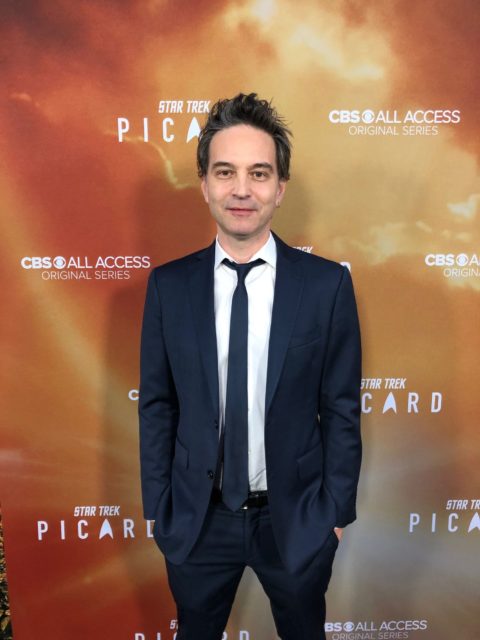

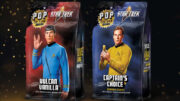
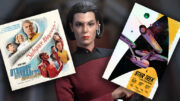
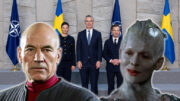
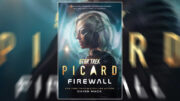
anybody else immediately scroll down to make sure “Blue Skies” was included?
OK, just me, then
I’m certain that they would never omit that haunting rendition.
Of course it’s included! It’s a bona fide hit single!
true, but often times a “score” soundtrack will omit “songs” in favor of pure instrumentals
I’ve frankly not been impressed with his music on Star Trek Discovery. Have been made a fan of his with his work on Picard, though. His use of leitmotifs have been pretty much perfect. My eyes started to well up when the Voyager theme appeared in 1×10. Definitely getting this soundtrack.
I did love his inclusion of the Voyager theme in the show, it honestly brought me home again. :)
Totally agree! Wasn’t much of a fan of his music in Discovery’s first season, and while his work for Season 2 was a huge step up already (much more fun!) he really nailed it on Picard – as you say mostly thanks to his use of themes, but it’s not just that. Anyway, the music for Picard is pretty much the only thing on this show I don’t have any complaints about. Russo did a great job in my opinion. Hoping for a physical CD release.
His main (one of only) highlights on Discovery was the music where Disco and Ent were awaiting the arrival of Control – really ramped up the scene.
I know this is an interview about Russo’s scoring the Picard show, but I saw this on Trekcore and couldn’t resist posting it here. Russo mentioned Noah Hawley and his work on the Star Trek movie (they are long time collaborators which I didn’t know) and just had this to say:
[Noah Hawley and I] have spoken about it, and we’ve talked what he is going to want from a musical perspective, and how to approach it, and what the story is looking like it’s going to be, which is extremely exciting to me. But it was not by design.
All of that was purely by coincidence, that I happened to be doing ‘Star Trek,’ but also happened to be a frequent collaborator of the next ‘Star Trek’ director.
He’s also a fan, and a good friend of mine, so when I started working on ‘Star Trek,’ we chatted about it, talked about it, had conversations about the storytelling, and the music, and the themes, and stuff.
He’s one to definitely talk about music with me, so when he called to say that his film was in the works, I was extremely excited.
[…]
There is absolutely nothing I can tell you… [except] for that it is really, really, really incredible. From what I have heard, it’s really, really thrilling.”
Obviously its nothing beyond the usual ‘it’s going to be the greatest Star Trek movie ever made, but other than that, I can’t say more’ but its news since it sounds like Hawley is still very much involved and at least (for now) another Star Trek film is still moving forward. I was starting to think that was already dead too since there hasn’t been a word said about it for months. This is great to hear especially since Tarantino’s script sounds DOA long ago. And maybe since they are both collaborators from past shows and now both working on Star Trek it wouldn’t be a shock Russo would be asked to score that film too (again IF it happens. Sadly we can’t discuss future Star Trek films without making disclaimers it’s only a possibility these days).
Both the themes of Discovery and Picard are uninspiring and follow the same formula: boring dirge and then rip off… sorry pay homage to original and better Star Trek themes at the end. Awful.
His music during the shows is above average though. Perhaps they could get Giacchino to score proper themes and let Russo have the in episode music.
His theme for Picard is perfect for television & the character @ a later point in his life, intimate, reflective. Giacchino is perfect for INAX, why he’s doing The Batman. Dirge?! Musical, lyrical. Rip off? Sentimental, nostalgic, loving appropriate tributes.
Yes it does reflect the show, it’s boring and plodding.
Agreed, they are boring. Not something iconic like Goldsmith’s scores.
Russo’s comment that he’s composing for Discovery S3 episodes 1-5 at the time of this interview suggests a few things about the timing of the season premiere:
– the first third of the season is close to complete in terms of editing, and perhaps the large lines of the vfx.
– if they can’t bring the orchestra and sound technicians into the studio due to physical distancing orders, it will be impossible to complete an orchestral score.
All to say that release of S3 could be much further away than we thought.
I agree that having him compose music for episodes 1-5 means that those are probably more or less locked.
If the complete lockdown continues for long they may opt to go digital with the score. Of course, it doesn’t sound the same as a live orchestra but you can build a score from sampled instruments.
Thanks DIGINON
I realize that composers often use sampled instruments as part of the composition process, but I wasn’t aware if it could be used to provide a final score of adequate quality. (Noting that while full digital orchestration can be a thing, in that case composers are intentionally playing on the differences that digital sampling provides.)
Perhaps a digital score could be used for first release, with a live orchestra being recorded later.
To be honest, I don’t think they would score the show twice and re-do the whole sound mix a second time. Whatever they decide to do now will likely be the final version.
Digital orchestras have been used for many years now.. some sound awful, some are quite good and indistinguishable from a real orchestra to 99% of the audience.
It’s very possible to create synth orchestral scores, albeit not nearly as good. But it certainly allows them to finish the score.
This guy has nothing on Dennis McCarthy, Ron Jones, Jay Chattaway etc.
All 3 of those composers wrote pieces that could cut you to the core and bring out a range of emotions.
None of the music on STD or Picard has done that for me.
Who r they?
What I do find odd is that his main theme is actually composed by Jay Chattaway – it was part of his score for “The Inner Light” and that’s why they added the credit for Chattaway composing “Lullaby #2” about halfway through the season. I’m not really sure why this credit wasn’t there from the beginning and why Russo does not talk about the use of Chattaway’s tune in any of these interviews at all. Sounds a bit to me that someone screwed up and as that, they don’t really want to talk about it.
Sounds about right
You missed the best, Goldsmith.. But I agree, not even on the same planet. ST:D and ST:P are boring, plodding and not something you can whistle.
I had these discussions a few months ago when PIC premiered but my feeling hasn’t changed about that.
I still believe that the PIC main theme (not the end credits!) is the counterpoint to Picard’s flute theme from “The Inner Light” and that both cues are linked via the traditional Scottish piece “Skye Boat Song” that is used as the Outlander main theme. The Inner Light represents the upward movement, the PIC main title is the downward movement. Both Trek themes are having a “conversation” about the “Skye Boat Song”… I love this connection, it’s just wonderful…
I also think the DSC theme is a spot-on variation of POTC3’s “Hoist the Colours”…
Garth Lorca, I’ve known the Skye Boat Song (in various versions/arrangements) since childhood.
I sincerely can’t say that I can see it as a link at all, it’s just some common instrumentation from that style/tradition of music.
I will grant that the main Picard theme is a counterpoint to Jay Chatterley’s Inner Light theme.
Well, considering that both themes were composed by Chattaway around the same time, it’s not all all surprising.
I just noticed, that a theme REAL close to the Picard-theme also appears in the movie “Braddock: Missing in Action III” which was also scored by Chattaway.
Discovery and Picard intros are too bland. “TV has changed” is utter bull as nobody WANTS it to change. We want Goldsmith style intros not themes that are totally forgettable.
I must say, I’m not a fan of the theme he’s written, but the score itself is pretty good. Nothing really memorable but it always works for the scene. Given, that Trek’s TV scores in the past could be pretty generic and forgetable, that’s high praise I guess :-D